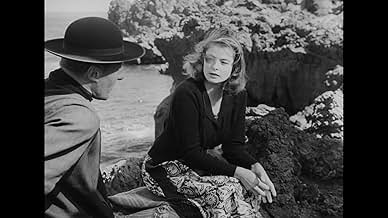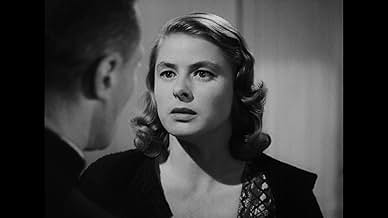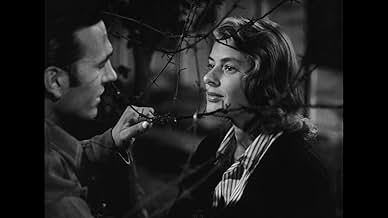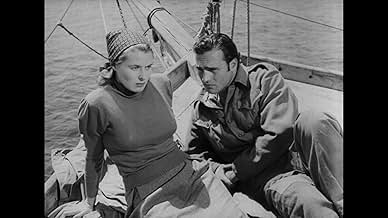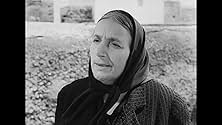IMDb रेटिंग
7.2/10
8.5 हज़ार
आपकी रेटिंग
अपनी भाषा में प्लॉट जोड़ेंKarin, a young woman from the Baltic countries, marries fisherman Antonio to escape from a prison camp. But she cannot get used to the tough life in Antonio's volcano-threatened village, Str... सभी पढ़ेंKarin, a young woman from the Baltic countries, marries fisherman Antonio to escape from a prison camp. But she cannot get used to the tough life in Antonio's volcano-threatened village, Stromboli.Karin, a young woman from the Baltic countries, marries fisherman Antonio to escape from a prison camp. But she cannot get used to the tough life in Antonio's volcano-threatened village, Stromboli.
- पुरस्कार
- 2 जीत और कुल 1 नामांकन
Gaetano Famularo
- Man with Guitar
- (बिना क्रेडिट के)
Angelo Molino
- Child
- (बिना क्रेडिट के)
Roberto Onorati
- Man
- (बिना क्रेडिट के)
फ़ीचर्ड समीक्षाएं
Rossellini's "Stromboli, terra di Dio" is a film on the line between fiction and reality more than usual for the acclaimed director. Most of the central part, where Karin just lives in Stromboli and complains about stuff was not written as in a normal screenplay: Rossellini chose possible elements of the environment or popular habits and filmed them in the movie, putting Karen in it like an extrernal observator. This has a double effect: neorealism comes to some of its highest achievements (like the tuna fishing and the eruption of the volcano) but to the loss of a fantastic actress such as Ingrid Bergman, who always feels out of place. Careful: I didn't say KAREN, I said BERGMAN. Because as a character she should be out of place, and she is even esthetically: she's always combed and white as the moon, while the inhabitants are rusty and dirty. But the actress herself is out of place in this film, and that is not a good thing at all. Her lines are dumb, repetitive, and Bergman actually did a great job managing to not disappear in such irrelevance. She still lives the scene, but her attempt is clearly forced into a new, uncharted territory as was Italian filmmaking for an American diva. We could say then that Ingrid is just as lost as her character.
What I just can't stand in this film is the necessity of squeezing the religious conversion (I'm talking about the Italian version of the film, American and International versions have slightly different endings for that time's commercial policies). It was the result of Rossellini's collaboration with powerful politicians and Church men, to be specific Giulio Andreotti and Felix Morlion, whose intention was to use a critically acclaimed author's cinema for political propaganda. I hate when other interests interfere with artistic purposes, and here the last moments are definitely flawed with an out of the blue realization of the power and existence of God for no good reason.
As I said before, neorealist features are what makes this film enjoyable and a classic. Apart from the brilliant scenes I mentioned above, I really liked the harsh depiction of the patriarchy that unfortunately still exists and thrives especially in the South of Italy. I actually felt bad and angry at Antonio as he jerks his wife with no respect and beats her like an animal, but I know very well that even today that is the norm in so many families and that simply pisses me off. Kudos to Rossellini for depicting that so realistically, but then again he's a great director exactly because of scenes like those.
What I just can't stand in this film is the necessity of squeezing the religious conversion (I'm talking about the Italian version of the film, American and International versions have slightly different endings for that time's commercial policies). It was the result of Rossellini's collaboration with powerful politicians and Church men, to be specific Giulio Andreotti and Felix Morlion, whose intention was to use a critically acclaimed author's cinema for political propaganda. I hate when other interests interfere with artistic purposes, and here the last moments are definitely flawed with an out of the blue realization of the power and existence of God for no good reason.
As I said before, neorealist features are what makes this film enjoyable and a classic. Apart from the brilliant scenes I mentioned above, I really liked the harsh depiction of the patriarchy that unfortunately still exists and thrives especially in the South of Italy. I actually felt bad and angry at Antonio as he jerks his wife with no respect and beats her like an animal, but I know very well that even today that is the norm in so many families and that simply pisses me off. Kudos to Rossellini for depicting that so realistically, but then again he's a great director exactly because of scenes like those.
Other recent commentaries on this film call it a "masterpiece". I strongly disagree. When it opened the reviews were as bleak and indifferent to it as Karen (Ingrid Bergman) is to the island of Stromboli. No one considered it up to Rossellini's "Open City" or "Paisan" in terms of genuine artifice. It was termed bleak and undistinguished with a plodding script that could only be called simplistic in terms of dialogue.
Fine B&W cinematography of a desolate island and scenes of an actual volcano eruption are not enough to make a 107-minute movie tailored to demonstrate the neo-realism of Ingrid Bergman's acting now that she had shed her Hollywood glamour. Bergman is ill served by a poorly developed character and embarrassingly inept scenes between her and her Italian fisherman husband (Mario Vitale).
There is startling realism in the tuna fishing sequence and harsh realism in the desolate landscape and close-ups of island people, but Rossellini did not seem to have a well developed or finished script in mind when he began shooting what others have called a "masterpiece". There is no doubt that had he the advantage of a well structured and conceived screenplay he might have been effective in telling this kind of story. But with the camera lingering on an anguished Ingrid Bergman sobbing in scene after scene of emotional isolation, the viewer is left with the feeling that this is little more than a post-war documentary in search of a coherent plot.
The unresolved ending used in the U.S. print is not the original ending, by the way, and leaves the viewer with the feeling he has witnessed an unfinished screenplay. It is said that Rossellini began shooting without a complete script on a day to day basis that must have been a strain on Bergman. It shows when he spends an inordinate amount of time on a fishing sequence that has little to do with furthering the slight plot. Too bad he didn't start the project with a finished script and a firm focus for his content.
The background music is oddly silent during some of the most emotional moments and despite Italian chants of fishermen the soundtrack remains mostly barren of any interesting content.
Fine B&W cinematography of a desolate island and scenes of an actual volcano eruption are not enough to make a 107-minute movie tailored to demonstrate the neo-realism of Ingrid Bergman's acting now that she had shed her Hollywood glamour. Bergman is ill served by a poorly developed character and embarrassingly inept scenes between her and her Italian fisherman husband (Mario Vitale).
There is startling realism in the tuna fishing sequence and harsh realism in the desolate landscape and close-ups of island people, but Rossellini did not seem to have a well developed or finished script in mind when he began shooting what others have called a "masterpiece". There is no doubt that had he the advantage of a well structured and conceived screenplay he might have been effective in telling this kind of story. But with the camera lingering on an anguished Ingrid Bergman sobbing in scene after scene of emotional isolation, the viewer is left with the feeling that this is little more than a post-war documentary in search of a coherent plot.
The unresolved ending used in the U.S. print is not the original ending, by the way, and leaves the viewer with the feeling he has witnessed an unfinished screenplay. It is said that Rossellini began shooting without a complete script on a day to day basis that must have been a strain on Bergman. It shows when he spends an inordinate amount of time on a fishing sequence that has little to do with furthering the slight plot. Too bad he didn't start the project with a finished script and a firm focus for his content.
The background music is oddly silent during some of the most emotional moments and despite Italian chants of fishermen the soundtrack remains mostly barren of any interesting content.
7cogs
"Stromboli" is a fascinating examination of suffering, desperation, faith and the desire for redemption. I've never liked Rossellini's films as much as Bresson's but I think the two directors often dealt with the same themes in similar ways, with minor stylistic variations. Where Rossellini used actors and non-actors who gave performances, Bresson used models and types who were instructed to remain impassive. Where Rossellini's films focused on passionate characters and emotional situations, Bresson approached his stories with a scientist's dispassion. I've always found Rossellini's films strange they are often parables that invest heavily in domestic melodrama and the histrionics of their characters. Nevertheless, I think "Stromboli" is one of his most successful films. Karin suffers so much--a war refugee, internment camp resident and then harried wife and social pariah on a desolate island--that it is easy to see how she is blind to faith. Despite her eventual redemption Rossellini doesn't paint Karin as a saint. Her protestations regarding the social politics of the island develop into a crusade to transgress their customs and protocols, often in self-righteous objection to the constraints placed on her. And her willingness to exploit her sexuality further confirms her all too human (and flawed) nature. The scenes where Karin attempts to seduce the priest and later seduces the lighthouse keeper are brimming with carnal sensuality. Bergman, as always, is excellent.
Even in a displaced persons camp, Ingrid Bergman, as Karen, a Lithuanian refugee, manages to dress better and look more beautiful than everyone around her. After her petition for passage to Buenos Aires is denied, she marries a POW from the adjacent camp. A native of the Italian volcanic island Stromboli, Antonio - Mario Vitale - brings her to his home. The village is a harsh place carved from the cinders of the mountainside, and half-deserted. As soon as she sets foot on the island, she can see she's made a mistake, but instead of accepting what she bargained for, she pesters Antonio to make more money so they can leave. He doesn't want to go - this is his home, and he is content even with this fussy wife. The men are fishermen, she constantly hears crying children, and the women dislike her immodesty. She redecorates the house, hiding his shrine and old photographs, putting out vases and flowers, turning her floral dresses into bright curtains. But she disregards the social rules, befriending a seamstress who's a "fallen woman" and playing in the sea with a group of boys. The inevitable clash between the peasant fisherman and the woman with aesthetic aspirations their simple life cannot satisfy, comes to a head with the eruption of the volcano. If I rated only the plot, this movie would earn a 5 - but the cinematography is magnificent. Otello Martelli's use of light and shadow, camera angle, and the restless natural world he filmed, create images that last long after the story has blown away like the fluff it is.
I know the Sight And Sound crowd loves it but I find it highly resistible for the same reason they venerate it, namely that watching an hour and forty minutes of Ingrid Bergman's spirit, individuality and, yes, arrogance crushed beneath the heel of complacent Italian peasantry is less than enthralling. Partially making up for this are Rossellini's three visually arresting set pieces, the Catching Of The Tuna and the Volcanic Eruptions. And of course Bergman is captivating, as usual. So, let's give it a B minus. PS...As wonderful as is the cinematography the sound sucks. Could maybe understand 60% of the English dialogue.
क्या आपको पता है
- ट्रिवियाDuring production of this film, Ingrid Bergman entered into an extra-marital affair with Roberto Rossellini and became pregnant, the two eventually getting married and having three children. The resulting scandal in America effectively blacklisted her from the North American movie market and she was even condemned by politicians and religious figures. She was finally forgiven and welcomed back to America upon the success of Anastasia (1956), but her Hollywood career was temporarily ended by this movie.
- गूफ़Though used by women, pants were not so popular on that time. Is strange that a poor refugee like the character played by Bergman wears pants almost the entire movie.
- क्रेज़ी क्रेडिटOpening credits: "I was found of them that sought me not; I was made manifest unto them that asked not after me." (New Testament, St. Paul's letter to the Romans, Chapter 10, Verse 20)
- इसके अलावा अन्य वर्जनSeveral running times exist. The main difference between the 81 min. US version and the 105 min. Italian version was in the ending, with religious themes cut out.
- कनेक्शनEdited into Histoire(s) du cinéma: Une histoire seule (1989)
टॉप पसंद
रेटिंग देने के लिए साइन-इन करें और वैयक्तिकृत सुझावों के लिए वॉचलिस्ट करें
- How long is Stromboli?Alexa द्वारा संचालित
विवरण
- रिलीज़ की तारीख़
- कंट्री ऑफ़ ओरिजिन
- भाषाएं
- इस रूप में भी जाना जाता है
- Stromboli
- फ़िल्माने की जगहें
- उत्पादन कंपनियां
- IMDbPro पर और कंपनी क्रेडिट देखें
बॉक्स ऑफ़िस
- बजट
- $10,00,000(अनुमानित)
- दुनिया भर में सकल
- $17,532
- चलने की अवधि
- 1 घं 47 मि(107 min)
- रंग
- पक्ष अनुपात
- 1.37 : 1
इस पेज में योगदान दें
किसी बदलाव का सुझाव दें या अनुपलब्ध कॉन्टेंट जोड़ें


